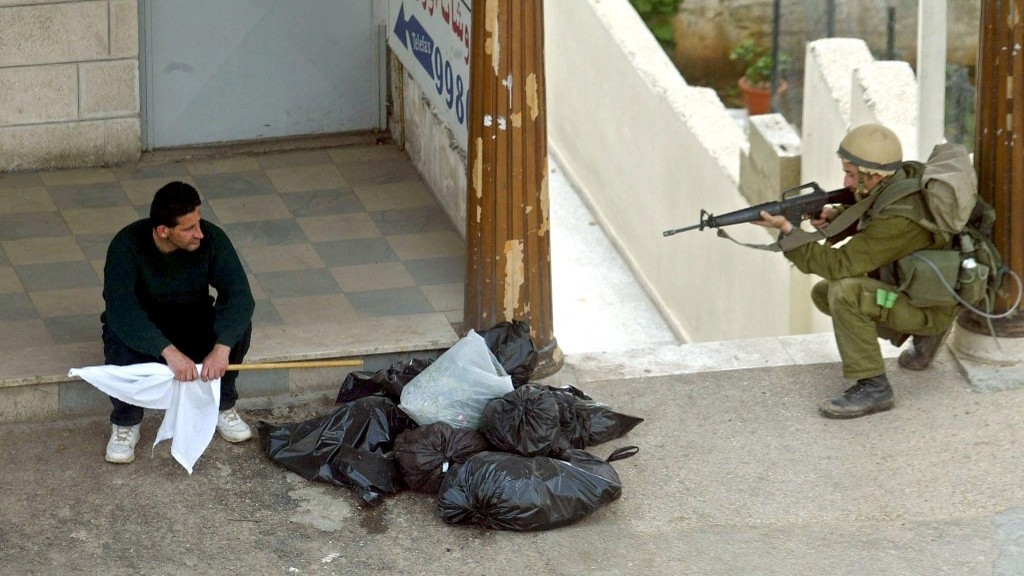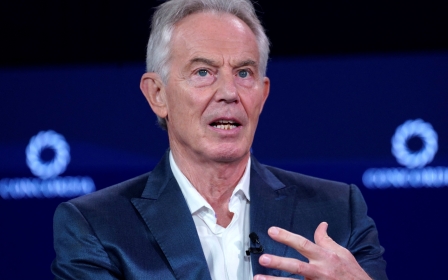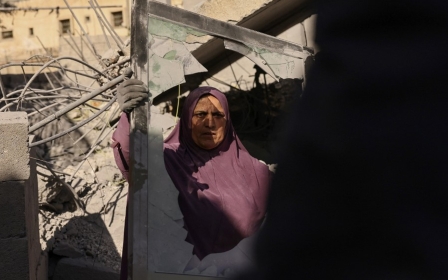Israeli military behaved 'like Russian army' in West Bank, UK warned

Britain warned the Israeli government that Israeli army behaviour in the West Bank was “more worthy of the Russian army” than a civilised country over 20 years ago, newly released official files show.
“I was not suggesting that such behaviour was a matter of policy,” British ambassador Sherard Cowper-Coles reported back after his meeting with then-Israel Prime Minister Ariel Sharon’s foreign policy adviser in 2002.
“But there was no doubt that individual soldiers were out of control and committing acts which were outraging international opinion.”
The meeting notes are among documents released by the National Archives on Tuesday which reveal British and American frustration during a major military incursion into the West Bank in 2002.
Sharon's Operation Defensive Shield, launched that March amidst the Second Intifada, came after a wave of suicide attacks had killed dozens of Israelis.
New MEE newsletter: Jerusalem Dispatch
Sign up to get the latest insights and analysis on Israel-Palestine, alongside Turkey Unpacked and other MEE newsletters
Palestinian leader Yasser Arafat's compound in Ramallah was besieged and partially demolished during the incursion which also saw phone and power lines cut, intense street fighting in the Jenin refugee camp and artillery attacks and air raids on southern Lebanon.
'There was no doubt that individual soldiers were out of control'
- UK Ambassador Sherard Cowper-Coles in 2002
Many of the concerns revealed in the files parallel those western allies have voiced over Israel’s offensive on Gaza, including repeated calls from UK and US officials to defuse tensions to no avail and worries that the fighting risked regional instability.
Like Gaza, much of the operation took place in densely populated areas with heavy weaponry, extensive damage to civilian infrastructure, and denial and delays of medical aid to some Palestinians which resulted in their deaths, the United Nations has said.
In addition to suggesting the Israeli military was behaving like the Russian military, likely a reference to Moscow's forces' brutal tactics in Chechnya a few years earlier, Coles warned Danny Ayalon, Sharon's adviser, that the operation was "a major strategic mistake".
'Making a martyr of him'
The files show that US President George W Bush was similarly perturbed, complaining in a private call with UK Prime Minister Tony Blair that Sharon's policies were turning Arafat into a martyr similar to Osama bin Laden.
"While Arafat had effectively been marginalising himself, Sharon had succeeded in making a martyr of him - building him up to the point where he was becoming the new bin Laden," Bush complained, according to a note of the call by the then-UK leader's office.
"The US had tried to persuade Sharon privately, but he just would not listen. The bottom line was that Sharon was undermining the US's ability to pursue the war on terrorism. That was not the action of a good ally."
Nearly 500 Palestinians were killed and 1,447 wounded in the operation which lasted just over a month.
The UN has reported that "an alleged 7,000" Palestinians were arrested during the operation and held for long periods with little or no outside contact.
"In many instances, the IDF followed a pattern of using loudspeakers to summon males between the ages of 15 and 45," the UN secretary-general said in an August 2002 report.
"According to human rights reports, significant numbers of the men arrested were blindfolded and handcuffed, not allowed to use a lavatory, and deprived of food or blankets during their first day in detention."
At least 8,425 Palestinians have been arrested by Israeli forces in the occupied West Bank in a massive, ongoing arrest campaign since the Hamas-led attacks on 7 October, according to Palestinian prisoner groups.
More than 500 Palestinians have been killed in Israeli raids in the West Bank since October.
Prisoners have been exposed to physical assault and other violations including starvation, sleep deprivation, cutting off contact with their families and the withholding of water.
Middle East Eye delivers independent and unrivalled coverage and analysis of the Middle East, North Africa and beyond. To learn more about republishing this content and the associated fees, please fill out this form. More about MEE can be found here.





